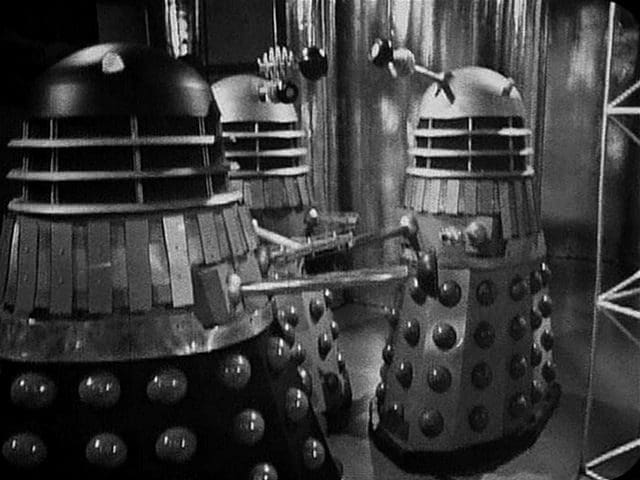
The Early Adventures S1 • Episode 4
An Ordinary Life
Sets:
The Early Adventures
Reviews and links from the Community
Review of An Ordinary Life by Seagullslost
Set at some point within the Daleks Masterplan story, The TARDIS lands in 1950's London, The Doctor takes ill and the ship shuts down, but where does this leave Steven and Sara?
Though Jean Marsh has featured as Sara Kingdom in a few Big Finish audios; the Companion Chronicles ones haven't been for me, and the lost stories 'The Destroyers' episode I couldn't finish. So this is really the first time I've been able to enjoy her as a companion. As with Peter Purvis as Steven, with his lost episodes been recreated of late, I've found a new appreicated for the character. So this is a change to experience a less explored era in Doctor Who.
An imigrant family come to the aid of the TARDIS team, who themselves face racism. The Doctor dissapears leaving Steven and Sara to get jobs and live an 'ordinary life' in 1950's London. With this being Doctor who there is an alien threat but its more in the background for most of the story only comming to the front towards the end.
I quite enjoyed it, being able to enjoy Steven and Sara as characters is nice. Its is one of stories where the regulars get a chance to stop and breathe rather than going from one crises to another. The racism is a little uncomfortable to listen to, but it is something we need to be reminded of.
Whether it really fits into the middle of the Daleks Masterplan is debatable, but like a lot of Big Finish I kind of see it as a chance to have more.
This review contains spoilers
Review of An Ordinary Life by Joniejoon
Another story that puts a main cast we’ve barely explored into a new setting. Very exciting stuff. Sadly, this story quickly turns indecisive with some very important messages.
The party lands in 1950’s London. The Doctor seems to have gotten a mysterious illness, but luckily the group gets taken in by an old man. All seems to be well for a bit, until both the Doctor and the Tardis have suddenly disappeared. Did he leave Sara and Steven behind?
This story has 2 focal points. First is the relationship between Steven and Sara, which builds on the previous story. The second is the racist attitudes of the 1950s. The old man and his newly arrived family members are from Jamaica, but have a hard time settling because of the racist attitudes the locals have. They are constantly harassed, while all they want is “An ordinary life”.
And the current premise allows for both points to get some attention. We’ve locked Steven and Sara in a time period, so they’ll have to be there for a while. They have nothing except each other left. No Tardis, no Doctor. This means all they have to rely on is each other. They take on jobs, cook together, discuss their future and their past. They really bond. It never gets as explicitly romantic as “The Anachronauts”, but there’s still a lot to love.
Being stuck in this location also allows for a more constant experience with the racism, which makes that part hit harder. They’ve connected with the local family and often hang out together. Steven even works together with Michael, the man of the new immigrated family. This allows us to see more of the obstacles that show up in the pursuit of the “ordinary life”. There are bigots at work, their window gets broken. Michael gets stuffed in a wooden crate. It’s not pretty.
What holds this story back, though, is the presentation of the villains. We technically have 2 villains here. First is the British society of the 1950’s. The presentation of the racist notions is, frankly, barebones. All the trouble of society is mostly put on 1 man in this story. Dock worker Billy is our entire representation of society. We have some other character that show up and reinforce him, but those are unvoiced and mostly consist of some laughing people in the background.
While I get the need for a stand-in for the societal viewpoint, the fact that this is really only 1 person detracts from the messaging in the story. We get a pretty expansive look at the everyday life of the immigrants. We see their home, their work, their shopping and have loads of conversations with them in between. Yet when it comes to the racism they face, 90% of it comes down to 1 man with a grudge. It’s a disingenuous stance to take to a society that was far from accepting. Sure, you always have good people and bad people, but the proportions here are out of balance. This paints a picture of 1950s society as a pretty good bunch with some bad apples, which is not the reality of the time. And I get that stories like these always skew reality to some extent, but if you handle a topic like this, you have to be genuine.
The second problematic enemy is the usual sci-fi villain. This time in the form of changeling anemones, that try to replace humanity and take their places in society. They originally latched on to Michael’s desire for “An ordinary life” and want to fulfill that for themselves. So they’ve kidnapped several humans and stuffed them in a jelly-like pod, while they replace them in a sort of zombie state.
I’m conflicted on what the story wants to accomplish with these enemies and how they connect to the themes in the story. In general, they are mostly a mirror image for the immigration situation. The anemone have the same desires, but instead of keeping their head down like the immigrant family, they invade and replace. They basically mirror the fears society hold towards people with different origins. They are the new people will replace them and erase them. But what’s the message there?
Frankly, a lot of bad things can be read from this. Why present the mirror image of the immigrants as the villains? Are the fears society hold justified? Should immigrants not fight for their rights? Is there no such thing as an “ordinary life” for outsiders? Frankly, these come across as problematic and should really be condemned in the messaging, but they just aren’t.
And I’m not trying to take a “bad faith” stance here. I’m looking for what the story has to say for itself. What is the message it wants to make clear? It handles a tough subject, but stays weirdly ambivalent when it comes to the bottom line. When you make an exact mirror image of the immigrant situation and end you story by tossing those mirror images in the Thames. What message does that send?
What this story could really have used, is a stronger conclusion. I think a big problem is the open stance it has towards its issues. It talks about issues, has events surrounding these issues, but never nails down what message the audience is actually supposed to get from the story. At the end, we leave the immigrant family to their fate in society. The anemone threat might be gone, but nothing has been done towards the racist notions of the time. This is something that is barely reflected upon. The Doctor just says that “Their presence will enrich England”, which is about as minimal as you can go. Talk about why they are better than the anemone. Talk about how the societal fears people hold don’t matter. Talk about what an “ordinary life” actually means and if that’s something worth striving for. Actual depth to the ending would’ve solved a lot of problems with this story. It’s not always wrong to make your takeaway obvious.
And that’s “An Ordinary Life”. While it definitely gets things right, like the setting, the side cast and relationship between Steven and Sara, it also has some crippling flaws. The more you think about this story the worse it gets. It doesn’t have the backbone to finish its messaging, which leaves us at an awkward middle ground. That’s really not somewhere you want this kind of story to end. Let’s hope other stories can be more decisive.
This review contains spoilers
Review of An Ordinary Life by escapeswitch
If any poor individual follows me on twitter, it's clear that I like this audio a whole lot. It's a lovely piece of character driven content for both Steven and Sara (most importantly the latter, who was criminally underutilised by the original run), with them stranded in England in the 1950s. I think it's impossible to talk about what makes an ordinary life so great, though, without mentioning our incredible supporting cast of Audrey, Joseph, and Michael - the incredibly kind and welcoming family that help our companions get (somewhat) settled in this new time and place. They're incredibly interesting and well-fleshed out in their own right (less so with Michael, but that's purely due to his role in the overarching plot that it's up to Steven and Sara (and the Doctor) to resolve.
My one criticism that I have of this audio is that it potentially tries to do too much, and then ends up almost doing too little. I think this story would have functioned well being slightly shorter, but closer to that tried and true 'pure historical' format. I'd like to spend more time looking at the similarities between Sara and Steven and their hosts, especially Audrey and Michael who have found themselves, like our companions, in an unfamiliar place. That, however, is not enough to take away from my overall enjoyment of this audio - and I'll remember Steven and Sara's attempt at cooking for a very long time. Maybe that's enough!
External Reviews / Opinion pieces
Community Ratings
(Updates coming soon:)
Add the last X members who rated it here
Add number of Favs, and who they are, here









